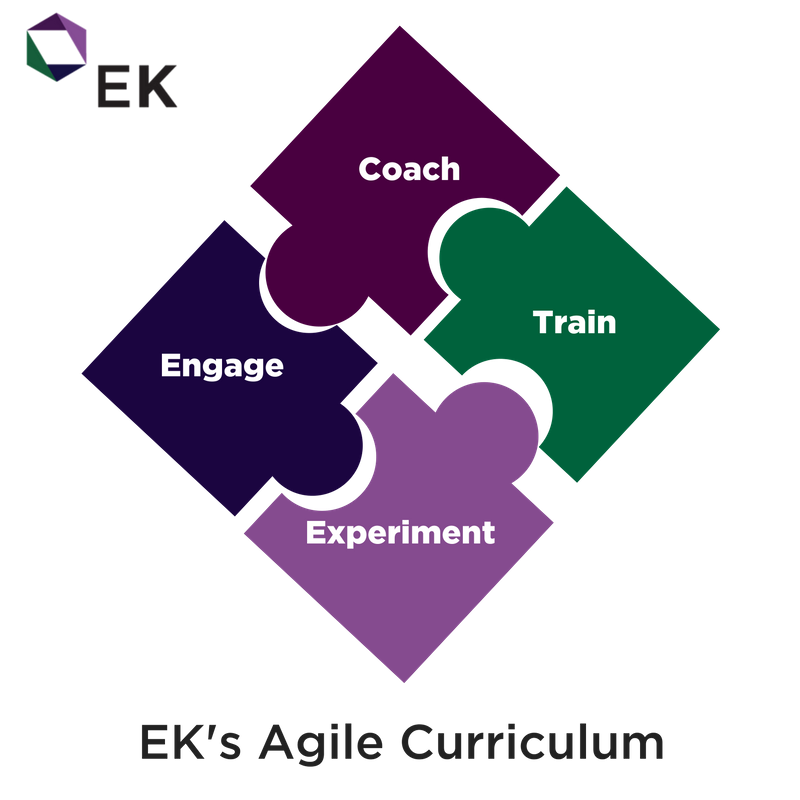 At EK, we often work with clients who are undergoing a second or even third attempt at an agile transformation. One of the most common complaints we hear is that a team attended a two- or three-day training class and was then expected by their leadership to drive an agile initiative.
At EK, we often work with clients who are undergoing a second or even third attempt at an agile transformation. One of the most common complaints we hear is that a team attended a two- or three-day training class and was then expected by their leadership to drive an agile initiative.
The key mistake in this approach is assuming a training class and certification will ensure that employees will retain, apply, and maintain agile principles properly. That is no more likely than thinking someone can run a restaurant after taking a weekend cooking class, or fly a plane after practicing in a simulator for a few hours. In fact, training is an event, while learning how to be agile is an ongoing process, one that requires a well thought-out curriculum built for adult learners.
One recent experience paints this picture all too clearly: a group started working in “sprints” that followed a classic waterfall approach – a requirements sprint, design sprint, a development sprint and a test sprint. They thought they were working in an agile fashion but were simply applying agile terminology to the way they had been working all along. Their certification gave them enough to know the words, but not enough to employ a true agile approach.
Here are the other essential parts of an agile curriculum that we find are the most overlooked:
Support Real-Life Agile Experimentation
Whether in agile or in life, experience is often the best teacher. After an agile training class ends, team members will attempt to apply lessons in their real work environment. This is when the trouble starts: a team may struggle with deciding on the “right” sprint length, tool selection, or the new role of a manager, and therefore find itself paralyzed by indecision. This frustrating experience may lead to resistance to agile, low morale, and even abandonment of agile altogether.
There are a few approaches we would recommend when dealing with these roadblocks. First, a team should be given a runway to figure out what processes, collaboration types, and approaches work best for them. This will require that the team has the authority to make decisions and “fail fast.” Second, a team should have access to experienced agile coaches who can help them navigate through thorny problems, provide just-in-time training, and serve as mentors when the going gets tough. These interventions will help the team gain confidence and ultimately be more successful. For example, I’ve coached teams as they wrestled with whether they can vary sprint lengths over time, or how many people reasonably can fit into a standup meeting.
Build a Learning Organization, Not a Training Organization
In order to increase the likelihood of agile adoption, learning should be integrated into company culture using change management engagement techniques. These “soft” approaches will be most impactful if they are peer-to-peer or employee-led. For example, teams I’ve worked with have used retrospective meetings to institute cross-training programs, form lunchtime interest groups, and test out tools like Slack. Other informal cultural approaches might be organizing company outings to agile events, gamifying e-learning approaches, or leading agile learning groups. These informal systems support and reinforce the lessons learned during a more formal training class and help keep them top of mind for learners.
In addition to providing informal learning opportunities, an agile learning curriculum should meet people where they are. Some team members will prefer experiential learning through scenarios and roleplay, some are visual learners who just need to whiteboard it out, and some do best listening to an educational podcast. Coaching and learning offerings for agile should speak to all of these types.
Did you complete your agile training or certification but are still struggling to figure out how to apply it properly? EK’s Agile Activation Workshop can help you put together a solid curriculum to make sure your agile transformation sticks. Contact us today at agile@enterprise-knowledge.com.
